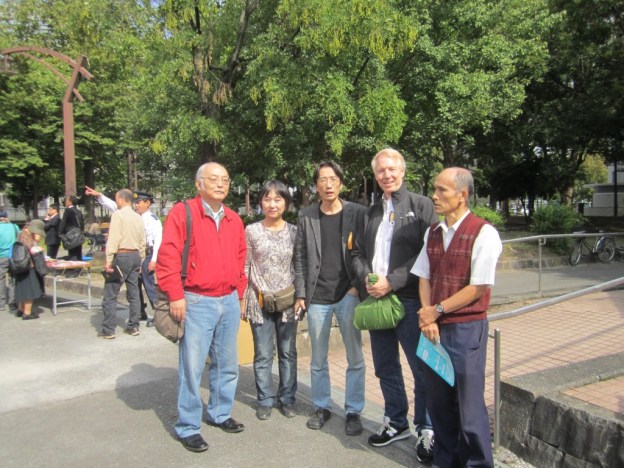
Seoul Before leaving Tokyo, Aki Okabe, a professor of business administration at Aichi Toho University specializing in nonprofit organizations, who had been my “guide” on Saturday, as one of his friends and I walked from the anti-nuclear squat to a park in the shadow of the giant Tokyo Tower to visit with a variety of groups with the Anti-Poverty Campaign who had assembled there. Yuasa Makoto, one of the primary organizers of the Campaign spent some time with me explaining the effort.
This rally brought together a dozen or so different organizations which focused on issues like the need for housing, the problems of migrant workers, the challenges faced by women, and so forth twice a year in order to network with each other and invite the public to join the campaign. They had come together in an Anti-Poverty Caravan in several large vans that had toured the country before arriving. There were buttons and t-shirts (I have them!), singers, speeches, and food made by community bakers and volunteers, all combining on a beautiful morning to create good spirit and support for fighting poverty.

I spent some time visiting in the tent that the Young Workers’ Union had pitched at the rally and offered some “atta-boys” of encouragement to the 20 or so in the circle when I spoke. The general secretary, Makoto Kawazoe, who had been part of the panel earlier in the week commenting on my lecture at Meiji, was there. The Young Workers’ Union (Shutoken Seinen Union) is trying to build an organization of irregular workers struggling in a variety of occupations to find stable employment in the current economy of contingent workers around the globe. Gayle Soto had introduced me to the Japanese slang term “freeters” as many of these young workers are called, derisively in some cases, because working informally they are not paying into the social security system, which is a big issue in an aging population.

Surprisingly, I found myself being in Seoul on Sunday night as the first guest “lecturer” to a class of 30 mostly young men and women who were facing the same issues and challenges as students preparing for the Korean job market and rather than going to university in the expected pattern were part of this “alternative university” trying to find something that made more sense to them. They were curious about community organizing and its potential in Korea, but had warned me they were interested in the “basics” and not to assume they had much of an idea about organizing or its potential. We ended up spending a fascinating couple of hours together first in the class and then with almost 20 of them in the bar across from the makeshift city community center where they had met.

What engaged them most was how I started organizing at 20 years old and founded ACORN at 21, since this was their time as well. They wanted to know how my parents felt, whether I was scared, how was I sure I would be able to eat, and similar questions which are probably on the minds of many, but few have bothered to ask me. They didn’t want to know about the successes of organizing, they wanted to know about my mistakes and how I managed to survive them. They were young. They knew they were going to make mistakes, too. They knew they were scared as they faced an uncertain future. They embraced the fact that it was possible to drop out of college, endure parental disapproval, forge a different way to the future, and that it would turn out all right and in fact might even be a great thing. My friend Na Hyowoo was one of the sparkplugs of this alternative university and had brought his lovely daughter to the session as yet another treat, and I could tell he was delighted at the turn the conversations had taken.

The personal becomes the political, and we talked of the student movements in Montreal and Chile and the excitement they were bringing to these same issues. I told them about the Young Workers’ Union in Tokyo and Bolivia. I told them about the anti-student debt campaigns in the USA, and about organizers and activists looking for another way to assemble unions and the community in Scotland and Canada. It became clear later in the bar that several groups of them had been talking earnestly about what they could do to take all of their anger and angst to the next step. It was fun to be able to strip it all bare, and just say, “Do it!”
